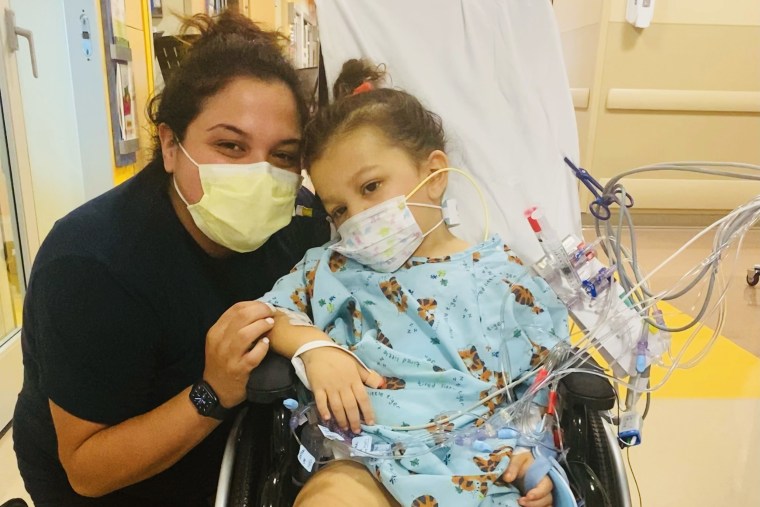The number of cases of unexplained, severe hepatitis in children continues to tick upward as doctors around the globe scramble to pinpoint a cause.
On Thursday, the World Health Organization said that about 170 cases have been reported so far in 16 countries, up from 74 cases in just the United Kingdom two weeks ago.
Ten percent of these cases have been so severe that children needed liver transplants. One child died, according to the WHO, though it's unclear where or when that death occurred.
In the United States, the Wisconsin Department of Health Services said Wednesday it is investigating the death of one child, as well as suspected cases in three other children. In addition to the possible fatality, one of those children needed a liver transplant.
Cases have also been identified in other states, including three in Illinois and two in North Carolina, according to those states’ health departments, and nine cases in Alabama.
The Centers for Disease Control and Prevention has only confirmed the cases in Alabama thus far, the agency said in a statement to NBC News on Thursday.
But experts say there are likely others, and the WHO called on health authorities from around the globe to report and investigate any unexplained cases of hepatitis in otherwise healthy children. Patients have ranged in age from 1 month through 16 years old, however most severe cases have tended to be among children ages 10 and younger.
Last week, the CDC issued a similar alert: a health advisory calling on physicians to be on the lookout for unusual and severe hepatitis in kids.
People commonly associate hepatitis with the hepatitis viruses, like hepatitis type A, B or C. But hepatitis simply refers to inflammation of the liver in general, and can have hundreds of causes: other viruses, medications, toxins and even contaminated food.
But no single cause has been identified that would link all of these cases, Richard Pebody, head of the WHO/Europe High-threat Pathogens team, said during an online question-and-answer session Thursday.
"These are children who have previously been fit and well," he said. "This is an unusual phenomenon that we're seeing, and that's why we're alerting parents and public health authorities." Historically, hepatitis that results in liver failure has been limited to children with underlying health conditions.
That's not to say that healthy children have never developed unexplained, severe hepatitis or needed a liver transplant. Last year, 501 children in the U.S. had a liver transplant, according to the United Network for Organ Sharing. The majority were younger than 6.
What's striking in these new hepatitis cases is that they've all occurred over a relatively short time frame, and the cause is unclear.
Dr. Markus Buchfellner, a pediatric infectious diseases fellow at the University of Alabama at Birmingham, first noticed the unusual pattern of unexplained hepatitis in that state last October.
The first patient had abdominal pain, jaundice and elevated liver enzymes that signaled hepatitis.
"Then we had a second one, and then a third one, and then a fourth one," Buchfellner said. "That's when we realized — maybe there's something here."
Ultimately, nine young patients ages 6 and younger in Alabama were identified. Two needed a liver transplant.
"Get to the hospital"
It was early July 2021 when Stefanie Cunha, of Gilbert, Arizona, noticed her daughter, Quinn, wasn't acting like her usual, otherwise healthy 3-year-old self.
Quinn was overly tired and she'd lost her appetite. "Then I noticed that the white part of her eyes were turning yellow, and I was like, something is off," Cunha said.

She took Quinn to her pediatrician, who did a blood test. Within hours, Cunha said the doctor called her and told her to stay calm and brace for what she was about to learn.
"Her liver numbers are not good, and she is close to liver failure. I need you to get to the hospital," Cunha recalls the doctor saying.
Quinn had hepatitis. Her liver function failed so rapidly that she needed a transplant within weeks of hospitalization.
But despite extensive testing, doctors never determined the cause of her illness.
"We do not know why she went into liver failure," said Quinn's doctor, Dr. Sheetal Wadera, medical director for liver transplantation at Phoenix Children's. Quinn had tested negative for Covid-19 and other viruses.
While Wadera has treated hepatitis in children for more than a decade, she told NBC News that she started seeing a slight increase in unexplained cases starting at the beginning of this year. (No cases have been officially reported by the Arizona Department of Health Services, however.)
Globally, doctors began noticing these unusual cases last fall. Quinn's case occurred last summer, but Wadera said that she and other investigators are now analyzing cases like Quinn's to look for possible links to the new cases.
A global sharing of notes will be useful moving forward, Wadera said. "In medicine, it is really helpful when we discover patterns and are able to make unifying diagnoses."
Clues to a cause
Despite the pandemic, no link has been made between the worldwide hepatitis cases to Covid-19 or its vaccine, officials said.
Some of the children with hepatitis were also diagnosed with Covid at the time of their illness, Pebody said, but not all. "This really needs further investigation," he said.
What's more, the majority of these children haven't received any Covid vaccines. "They're not in the age group that, in most countries, is recommended for vaccination," Pebody said. In the U.S., for example, cases in which the ages are known have been in children 6 and under. Only kids 5 and up are eligible for the Covid vaccine.
However, one virus is starting to emerge as a potential culprit: adenovirus type 41. It can cause respiratory and gastrointestinal symptoms, and, though unusual, has been known to cause severe hepatitis in children with weakened immune systems, according to the CDC.
Adenoviruses, in general, are usually linked to cold-like symptoms, and don't often cause severe illness.
Five of the nine otherwise healthy children who developed hepatitis in Alabama tested positive for adenovirus 41. The other four children also tested positive for an adenovirus, but doctors weren't able to determine the specific type.
Pebody said that health officials in the U.K. have noted an uptick in adenovirus cases in general. "We don't understand it fully, but it's very much an active line of investigation," he said.
Symptoms to look for
Physicians across the U.S. are also joining the search for answers.
"Those of us who are pediatric liver doctors across the country have been talking about ways to collect this information so that we all can better understand what's going on," said Dr. Amy Feldman, the pediatric liver transplant medical director at Children’s Hospital Colorado.
"We are now adding adenovirus to the slew of labs that we get to evaluate a child who might come in with severe hepatitis," she said.

Nearly a year after her transplant, Quinn is thriving.
"She sailed through with minimal complications," Wadera said. "We expect her to do all of the great things a child her age would do."
Parents know their children best, Wadera said, and even though these unexplained cases of liver inflammation are rare, it's important to be aware of how kids are acting.
Vomiting, nausea, diarrhea and abdominal pain may can all be symptoms of liver inflammation. Jaundice, as in Quinn's case, is also a tell-tale sign.
"Just watch your child. If you have concerns, take them to your pediatrician, your local doctor or emergency room," Wadera said.
Follow NBC HEALTH on Twitter & Facebook.

